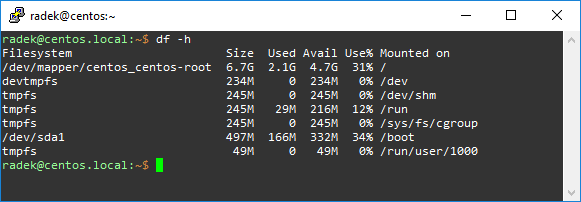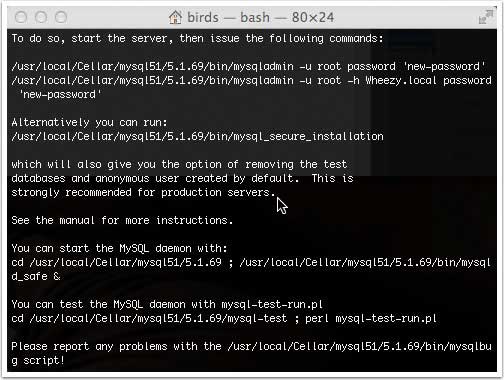最近登录某台服务器的mysql时候总报错: Accessroot@log01 # mysql -u root -p Enter password: ERROR 1045 (28000): Access denied for user 'root'@'localhost' (using password: NO) denied for user 'root'@'. To do this, run brew services start mysql. By default, brew installs the MySQL database without a root password. To secure it run: mysqlsecureinstallation. To connect run: mysql -uroot. Root is the username name here. Before start, must stop MySQL or MariaDB. Use this command (brew services stop mysql), For MariaDB brew services stop mariadb; ibdata1 file copy from backup mysql folder and paste and replace it inside new installed mysql folder's ibdata1 (usr/local/var/mysql) or mamp/xampp mysql folder location. Iblogfile0 and iblogfile1 no need to replace. WARNING: Install JQ on your Mac before running the commands suggested on this section. Brew update brew install jq To check the required memory of your VM, open a terminal and run the command below.
- Restart Mysql Mac Brew Pub
- Restart Mysql Mac Brew Settings
- Restart Mysql Mac Brew Command
- Restart Mysql Mac Brew Manual
In the default installation, XAMPP-VM has no passwords set and it is not recommended to run XAMPP-VM with this configuration accessible by others.To make the installation more secure:
Restart Mysql Mac Brew Pub
- Launch the stack manager by double-clicking the XAMPP icon in the mounted disk image.
- Ensure that all services are running in the 'Services' tab of the stack manager (or start them as needed).
- Open a new terminal from the 'General' tab of the stack manager and run the following command in it:
tail -2 /opt/lampp/logs/error_log - You should see the following dialog on your screen. Enter responses to each prompt.
XAMPP: Quick security check...
XAMPP: MySQL is accessable via network.
XAMPP: Normaly that's not recommended. Do you want me to turn it off? [yes] yes
XAMPP: Turned off.
XAMPP: Stopping MySQL...
XAMPP: Starting MySQL...
XAMPP: The MySQL/phpMyAdmin user pma has no password set!!!
XAMPP: Do you want to set a password? [yes] yes
XAMPP: Password: ******
XAMPP: Password (again): ******
XAMPP: Setting new MySQL pma password.
XAMPP: Setting phpMyAdmin's pma password to the new one.
XAMPP: MySQL has no root passwort set!!!
XAMPP: Do you want to set a password? [yes] yes
XAMPP: Write the passworde somewhere down to make sure you won't forget it!!!
XAMPP: Password: ******
XAMPP: Password (again): ******
XAMPP: Setting new MySQL root password.
XAMPP: Setting phpMyAdmin's root password to the new one.
XAMPP: The FTP password for user 'nobody' is still set to 'lampp'.
XAMPP: Do you want to change the password? [yes] yes
XAMPP: Password: ******
XAMPP: Password (again): ******
XAMPP: Reload ProFTPD...
XAMPP: Done.

After calling this command, your XAMPP-VM installation should be more secure.
Troubleshooting¶
If you can’t find the solution to your problem here then participate in thecommunity! You can:
- Join the
#geodjangoIRC channel on Freenode. Please be patient and polite– while you may not get an immediate response, someone will attempt to answeryour question as soon as they see it. - Ask your question on the GeoDjango mailing list.
- File a ticket on the Django trac if you think there’s a bug. Makesure to provide a complete description of the problem, versions used,and specify the component as “GIS”.
Library environment settings¶

By far, the most common problem when installing GeoDjango is that theexternal shared libraries (e.g., for GEOS and GDAL) cannot be located. [1]Typically, the cause of this problem is that the operating system isn’t awareof the directory where the libraries built from source were installed.

In general, the library path may be set on a per-user basis by settingan environment variable, or by configuring the library path for the entiresystem.
LD_LIBRARY_PATH environment variable¶
Restart Mysql Mac Brew Settings
A user may set this environment variable to customize the library pathsthey want to use. The typical library directory for softwarebuilt from source is /usr/local/lib. Thus, /usr/local/lib needsto be included in the LD_LIBRARY_PATH variable. For example, the usercould place the following in their bash profile:
Setting system library path¶
On GNU/Linux systems, there is typically a file in /etc/ld.so.conf, which may includeadditional paths from files in another directory, such as /etc/ld.so.conf.d.As the root user, add the custom library path (like /usr/local/lib) on anew line in ld.so.conf. This is one example of how to do so:
Restart Mysql Mac Brew Command
For OpenSolaris users, the system library path may be modified using thecrle utility. Run crle with no options to see the current configurationand use crle-l to set with the new library path. Be very careful whenmodifying the system library path:
Install binutils¶
Restart Mysql Mac Brew Manual
GeoDjango uses the find_library function (from the ctypes.util Pythonmodule) to discover libraries. The find_library routine uses a programcalled objdump (part of the binutils package) to verify a sharedlibrary on GNU/Linux systems. Thus, if binutils is not installed on yourLinux system then Python’s ctypes may not be able to find your library even ifyour library path is set correctly and geospatial libraries were built perfectly.
The binutils package may be installed on Debian and Ubuntu systems using thefollowing command:
Similarly, on Red Hat and CentOS systems:
